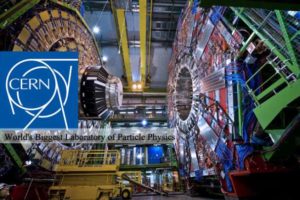India and European Organisation for Nuclear Research (CERN) signed an agreement on November 21, 2016 to make India an Associate Member State of the research organization.
- The agreement was signed between Sekhar Basu, Chairman of the Atomic Energy Commission and Secretary of the Department of Atomic Energy (DAE) in India, and Fabiola Gianotti, General Director at CERN.
- After becoming the associate member of CERN India will have to contribute a certain amount of money for research activities that would involve annual contribution of 11.5 million swiss frank from Indian government to CERN
- Pakistan, Turkey and Ukraine are the current Associate Member States with CERN.
Benefits of agreement :
- The agreement is expected to strengthen the ties between Indian scientists and CERN.
- Being an Associate Member State, India can take part in the CERN council meetings.
- India will play a part in the decision making process of financial and scientific calls by CERN.
- Indian scientists can be appointed as staff at CERN.India will also be able to bid for CERN contracts.
- Young Indian scientists and engineers can participate in various CERN projects and bring back knowledge for deployment in the domestic programmes.
Contribution of India to CERN
Indian scientists have been involved in all outstanding activities at CERN since 1970’s. Indian scientists from the Tata Institute of Fundamental Research (TIFR) have been participating in experiments at CERN.India has contributed hardware and software to CERN.
- Later in 1990’s scientists from the Raja Ramanna Centre for Advanced Technology, Indore joined CERN to build components for the LEP accelerator and the L3, WA93 and WA89 detectors. Their scientists participated in important physics analyses and publications throughout the years.

- India and CERN also signed a Cooperation Agreement in 1991, to set priorities for scientific and technical cooperation, followed by the signature of several Protocols.
- India also played a role in the construction of the Large Hadron Collider in 1992, regarding the design, development and supply of hardware accelerator components/systems and its commissioning and software development and deployment in the machine.
- Indian scientists have played a significant role in the Compact Muon Solenoid (CMS) experiments, which is one of the two large experiments that have led to the discovery of the Higgs Boson.
About CERN
The European Organization for Nuclear Research known as CERN is a European research organization that operates as the largest particle physics laboratory in the world. It was established in 1954 and the organization is based in a northwest suburb of Geneva on the Franco–Swiss border, and has 22 member states.
- CERN’s main function is to provide the particle accelerators and other infrastructure needed for high-energy physics research because of which numerous experiments have been constructed at CERN and also resulting in international collaborations.
- Headquarter: Meyrin, Canton of Geneva, Switzerland
- President: Sijbrand de Jong




